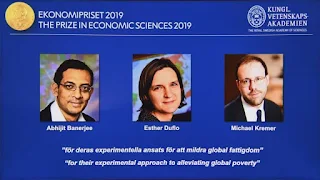Economics and climate change can be related, do we think about it?
We often relate the poverty with the karma of past birth, until Dada Bhai Naoraji, an Indian economist during 1860s presented a reasonable argument.
He stated that poverty was a system failure as Britishers drained the money from India, and Indians were in the poorer state due to the unequal distribution of wealth.
However, that was the past, and until now, poverty has been misunderstood as a divine curse or testing of faith.
Did we ever think about poverty that one decision of getting wrong and unaccountable education can keep us ‘poor’ Or one decision of parents can influence our economic life?
The Nobel prize 2019, was awarded to three economists who provided a practical solution between poverty and the circumstances. Their number of researches has shown that ‘poor teaching methods’ can lead to poverty.
Here are the winners of the Nobel Prize in economics and why they won it
The winners of 2019 of the Nobel Prize for Economics were announced at the Royal Swedish Academy of Sciences in Stockholm, Sweden, on October 14, 2019.
- The Nobel prize in economics was awarded to Abhijit Banerjee, Esther Duflo and Michael Kremer for “their experimental approach to alleviating global poverty.
Due to their research, the ability to fight global poverty has increased.
- At 46 Esther Duflo is the youngest person to ever win the prize in its 50-year history, and she’s also just the second woman to win.
Banerjee and Duflo are professors at the Massachusetts Institute of Technology, where the husband-wife duo founded and oversee the Abdul Latif Jameel Poverty Action Lab, and Michael Kremer is an economist at Harvard University.
What did they contribute?
Their research is now delivering a steady flow of concrete results, helping to alleviate the problems of global poverty
The trio has made vast contributions to the study of development economics by pioneering an on-the-ground approach.
Rather than looking at poverty solely from a broad, theoretical standpoint, the three shifted the focus to smaller issues within the vastly complex problem.
After isolating key areas of interest, they pioneered the model of subsequently designing field experiments to observe issues, such as poor education, in actual practice to help determine the myriad of factors that contribute to the problem.
Their contribution to the field has been large, as “field experiments have become development economists’ standard method when investigating the effects of measures to alleviate poverty.
Their research has focused on education and health care, among other things.
One key study, led by Professor Kremer, centered on the most effective way to increase performance at schools in the poorest communities.
Through a number of field experiments in Western Kenya, the researchers found that a lack of resources wasn’t the primary reason for under-performing schools and pupils, but rather a lack of teaching support and an overall lack of teacher accountability.
Other studies have focused on everything from how price impacts parents’ decisions to give their children de-worming pills, to how mobile clinics can increase rates of vaccination, to the impact of microcredit programs.
Put simply, they draw meaningful and actionable conclusions from on-the-ground research.
The WHO is among the global organizations that have made recommendations based on Banerjee, Duflo and Kremer’s findings.
“This year’s Laureates have introduced a new approach to obtaining reliable answers about the best ways to fight global poverty ...They have shown that these smaller, more precise, questions are often best answered via carefully designed experiments among the people who are most affected,” the statement from the Royal Swedish Academy of the Sciences read.
In just two decades, their new experiment-based approach has transformed development economics, which is now a flourishing field of research.
French-born Duflo, at 46, is the youngest person ever to win the coveted prize. She is also the second woman to win in the award’s 50-year history, after Elinor Ostrom in 2009.
In The End,
The poverty traditionally poverty measures often calculated by a number of people who earn less than $1.90 a day- shed light on how little people earn but not on whether or how they experience poverty in their day-to-day lives.
Children in poverty are more likely to be hungry or malnourished, exposed to trauma, stress or violence, affected by family or neighborhood turmoil or faced with severe health problems.
Poverty and early adversities significantly impact brain development, contributing to a vicious cycle of poverty.
Therefore, it was a much-needed approach to provide better policies at ground level which identifies the real problems and implement solutions accordingly.














No comments:
Post a Comment